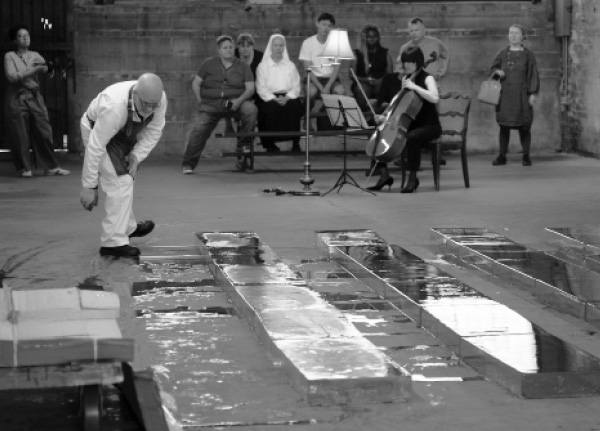
HISTORY AND FORGETTING
first performed on September 16, 2017
Silent Funny exhibition space, Chicago, IL
performed once in 2017
INDUSTRY OF THE ORDINARY
(ADAM BROOKS / MATHEW WILSON)
Chicago, Illinois/Dorset, UK
739555407i739555407n739555407d739555407u739555407s739555407t739555407r739555407y739555407o739555407f739555407t739555407h739555407e739555407o739555407r739555407d739555407i739555407n739555407a739555407r739555407y739555407@739555407g739555407m739555407a739555407i739555407l739555407.739555407c739555407o739555407m
industryoftheordinary.com
HISTORY AND FORGETTING
INDUSTRY OF THE ORDINARY
On a concrete shop floor, Industry of the Ordinary construct a flag from ice blocks (weighing a cumulative 3550 pounds), which, as it melts, washes away the dust, oil, blood, and sweat that has stained the floor over its many years of use. As the flag passes into memory, the former life of the space it temporarily occupies is remembered.
Accompanying the flag’s disappearance are the recorded voices of inhabitants, workers, and former workers from the surrounding area. These voices fill the space and remain audible, although disembodied, after the flag melts away. We spent the summer of 2017 recording interviews with current and former workers in and around the 4106 West Chicago Avenue location in the Austin district. This oral history endures as a tangible record of the neighborhood over the years.
Throughout the melting process, a lone musician, Katinka Kleijn, (cellist for the Chicago Symphony Orchestra), plays the cello parts from Anton Bruckner’s 4th and 9th symphonies. Meanwhile, artist Lindsey French documents Industry of the Ordinary’s and Kleijn’s presence in the space, using data collection, interpretation and other technologies. The day’s activities are framed at sunrise and sunset by two aerial banners being flown over the City of Chicago, the first declaring WE ARE NOT RESPONSIBLE and the second WE ARE RESPONSIBLE.
During the last election campaign, there was a dedicated attempt by the Republican nominee to draw away the working class vote in the industrialized Midwest by promising a return of industrial capacity and pulling back from a globalized economy. Inevitably, the promises were based on oversimplifications and an invitation to remember a halcyon past by a man and a party that has always seen labor as expendable. In this piece, we suggest that workers, their jobs, and their places of work are our collective responsibility. We celebrate the nobility of the working body and the humanity of labor. In addition, the physicality of constructing the work foregrounds the inevitable breaking down of our aging bodies, which have increasingly become an oblique focus of our work.